
Protect and Survive
This booklet tells you how
to make your home and family as safe as possible under nuclear
attack

Foreword
If the country were ever faced with an immediate threat of nuclear war, a copy of this booklet would be distributed to every household as part of a public information campaign which would include announcements on television and radio. That should sort everything out, eh? The booklet has been designed for free and general distribution in that event. It is being placed on sale now for those who wish to know what they would be advised to do at such a time.
May 1980
If Britain is attacked by nuclear bombs or by missiles, we do not know what targets will be chosen or how severe the assault will be. Sorry.
If nuclear weapons are used on a large scale, those of us living in the country areas might be exposed to as great a risk as those in the towns. The radioactive dust, falling where the wind blows it, will bring the most widespread dangers of all. No part of the United Kingdom can be considered safe from both the direct effects of the weapons and the resultant fall-out. Not even Swindon.
The dangers which you and your family will face in this situation can be reduced if you do as this booklet describes.
Read this booklet with care
Your life and the lives of your family may depend upon it
Do as it advises
Keep it safely at hand
1 Challenge to survival
Everything within a certain distance of a nuclear explosion will be totally destroyed. That is a scientific fact.
Even people living outside this area will be in danger from -
HEAT AND BLAST
The heat and blast are so severe that they
can kill, and destroy buildings, for up to five miles from the
explosion. Beyond that, there can be severe damage.
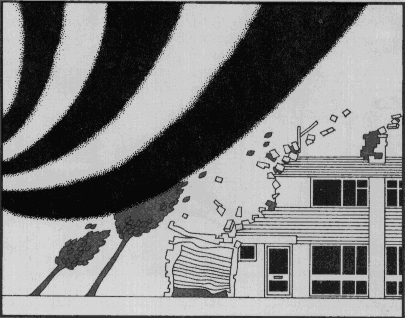
FALL-OUT
Fall-out is dust that is sucked up from the ground by the explosion. It can be deadly dangerous. It rises high in the air and can be carried by the winds for hundreds of miles before falling to the ground. The radiation from this dust is dangerous. It cannot be seen or felt. It has no smell, and it can be detected only by special instruments. Exposure to it can cause sickness and death. If the dust fell on or around your home, the radiation from it would be a danger to you and your family for many days after an explosion. Radiation can penetrate any material, but its intensity is reduced as it passes through - so the thicker and denser the material is, the better.
No really. This shit is serious.

2 Planning for survival
Stay at Home
Your own local authority will best be able
to help you in war. Unless you live in Lambeth, in which case
you haven't got much hope. If you move away, the authority in
your new area will not help you with accommodation or food or
other essentials. In fact, they'll do their best to run you out
of town with dogs and sticks. If you leave, your local authority
may take your empty house for others to use. And they'll probably
give it to dirty hippies with fleas who'll (a) use your best crockery
to grow their dope in and (b) smear dogshit over the duvet your
mum gave you at Christmas.
So stay at home.
Plan a Fall-out Room and Inner Refuge
The first priority is to provide shelter within your home against radioactive fall-out. Your best protection is to make a fall-out room and build an inner refuge within it. Because you'll be spending a lot of time in this area, think of it as your own pub. The fall-out room is the lounge bar and the inner refuge is the snug.
First, the Fall-out Room
Because of the threat of radiation you and
your family may need to live in this room for fourteen days after
an attack, almost without leaving it at all. So you must make
it as safe as you can, and equip it for your survival. Choose
the place furthest from the outside walls and from the roof, or
which has the smallest amount of outside wall. The further you
can get, within your home, from the radioactive dust that is on
or around it, the safer you will be. Use the cellar or basement
if there is one. Otherwise use a room, hall or passage on the
ground floor.
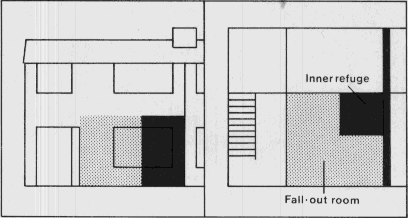
Even the safest room in your home is not
safe enough, however. (doh!) You will need to block up windows
in the room, and any other openings, and to make the outside walls
thicker, and also to thicken the floor above you, to provide the
strongest possible protection against the penetration of radiation.
Thick, dense materials are the best, and bricks, concrete or building
blocks, timber, boxes of earth, sand, books, and furniture might
all be used. Stick up a few posters of football players if you
want. And some of those peanut things with the half naked lady
underneath. That should make it nice and homely.
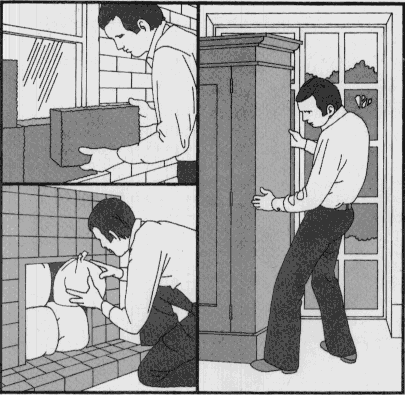
Now the Inner Refuge
Still greater protection is necessary in the fall-out room (or lounge bar), particularly for the first two days and nights after an attack, when the radiation dangers could be critical. To provide this you should build an inner refuge (or snug). This too should be thick-lined with dense materials to resist the radiation, and should be built away from the outside walls.
Here are some ideas:
1. Make
a 'lean-to' with sloping doors taken from rooms above or strong
boards rested against an inner wall. Prevent them from slipping
by fixing a length of wood along the floor. Build further protection
of bags or boxes of earth or sand - or books, or even clothing
- on the slope of your refuge, and anchor these also against slipping.
Partly close the two open ends with boxes of earth or sand, or
heavy furniture. And if you believe that's going to help you in
the grim wasteland of a post nuclear world you must be more stupid
than you look. But do it anyway. It'll give you something to do.
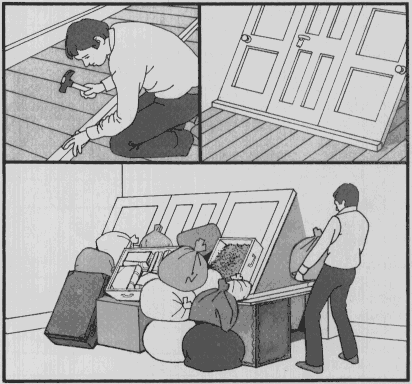
2. Use
tables if they are large enough to provide you all with shelter.
Surround them and cover them with heavy furniture filled with
sand, earth, books or clothing.
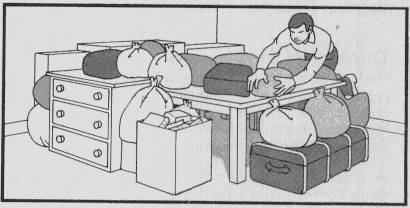
3. Use the cupboard under the stairs if it is in your fall-out
room. Put bags of earth or sand on the stairs and along the wall
of the cupboard. If the stairs are on an outside wall, strengthen
the wall outside in the same way to a height of six feet. Your
house will now look like that advert where the girl goes "oh
no, it's terrible, you've had burglers", but in fact the
bloke is just untidy. Yellow Pages I think. You know the one.
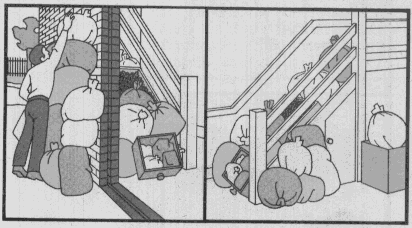
PLAN YOUR SURVIVAL KIT
Five essentials for survival in your Fall-out Room
1 Beer
You will need enough for the family for
fourteen days. Each person should drink two pints a day - so for
this you will need three and a half gallons each. You should try
to stock twice as much beer as you are likely to need for drinking,
in case anyone pops round unexpectedly. You are unlikely to be
able to nip out to the off license after an attack - so make sure
you get plenty of cans in as well. Store extra beer in the bath,
in basins and in other containers. Seal or cover all you can.
Anything that has fall-out dust on it will be contaminated and
dangerous to drink or to eat. You cannot remove radiation from
beer by boiling it. But if you're desperate go ahead and drink
it. I mean, what's the worst that could happen?

2 Food
Stock enough food for fourteen days. Choose
foods which can be eaten cold, which keep fresh, and which are
tinned or well wrapped. Like crisps, twiglets, peanuts and Porky
Scratchings. Keep your stocks in a closed cabinet or cupboard.
Provide variety. Plain and cheese and onion. See what we're
saying? Stock sugar, jams or other sweet foods, cereals, biscuits,
meats, vegetables, fruit and fruit juices. Children will need
tinned or powdered milk, and babies their normal food as far as
is possible. Eat perishable items first. Use your supplies sparingly.

3 Portable Radio and Spare Batteries
Your radio will be your only link with the
outside world. So take a spare one with you if you can. Then you'll
have two links. Clever, huh? Keep any aerial pushed in. Don't
bother listening to the news - it'll only be upsetting. Tune in
to the first station you find playing Bon Jovi and Dennis Waterman
and stick there.

4 Tin Opener, Bottle Opener, Cutlery and Crockery
You'll need things to throw at each other
when you get bored.
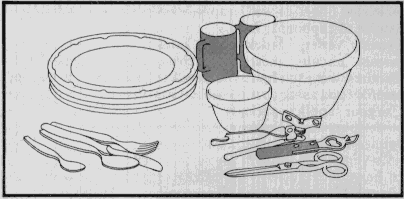
5 Natty togs for when you come out
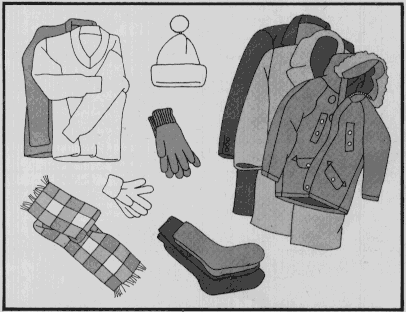
You don't want to look like a berk when it's all over, dressed
in Millets gear and an old anorak, do you? Make sure you get a
load of good labels in. Ralph Loren, LeCoste, Bim Sherman, that
kind of thing. Proper smart. Get it?
And don't
forget to take this booklet with you
These further items will also
be useful in the Fall-out Room:
6. Bedding, sleeping bags
7. Portable stove and fuel, saucepans
8. Dartboart
9. Table and chairs
10. Toilet articles soap, toilet rolls, bucket and spade
11. Changes of clothing
12. First aid Kit - with household medicines and prescribed medicines.
And at least aspirins or similar tablets (because those hangovers
are bound to be nasty), adhesive dressings, cotton wool, bandages,
disinfectant, ointment, including 'Vaseline' ( you never know).
13. Box of dry sand. God knows what this is for.
14. Notebook and pencils for messages
15. Brushes, shovels and cleaning materials, rubber or plastic
gloves, dustpan and brush. Sounds a bit kinky, but that's what
it says here.
16. Toys and magazines. Men's Health. Cage And Aviery Bird. Yachting
Monthly. She. BBC Vegetarian Magazine, and The Spectator are all
worth getting.
17. Clock (mechanical) and calendar
Sanitation
You will need special sanitation arrangements because there will be no water to waste in lavatories.
Keep these items in the Fall-out Room:
Containers such as polythene buckets, fitted with covers and -
if possible - improvised seats.
Polythene bag linings for emptying the containers.
Strong disinfectant and toilet paper.
A duster.
Keep these items just outside the Fall-out Room:
A dustbin for the temporary storage of sealed
bags of waste matter
A second dustbin for food remains, empty tins and other rubbish
A third dustbin for wood shavings and bits of paper
A fourth dustbin for belly button fluff
A fifth dustbin for lard
A sixth dustbin for nasal hair and bread crusts
A seventh dustbin for old socks
If you have only one dustbin, use that for toilet waste only. Put all other rubbish in plastic bags or paper until you can take it outside the house.
Limit the Fire Hazards
As you plan the fall-out room and the inner
refuge you need also to limit as far as you can the dangers from
heat and blast to the rest of the house. Though the heat could
not ignite the bricks and stone of your home it could set alight
the contents by striking through unprotected windows.
There are things you can do now to lessen these risks -
Remove anything which may ignite and burn easily (stamp collections,
matchstick sculptures, that kind of thing) from attic and upper
rooms where fire is most likely.
Remove net curtains or thin materials from windows - but leave
heavy curtains and blinds as these can be drawn before an attack
as protection against flying glass. Glass that walks or gets the
car won't be affected by these.
Clear out old newspapers and magazines. Yes, all magazines. Even
those under the bed in the spare room.
Coat windows inside with diluted emulsion paint of a light colour
so that they will reflect away much of the heat flash, even if
the blast which will follow is to shatter them. Blue perhaps.
Or a nice yellow.
If you have a home fire extinguisher - keep it handy. Like you
wouldn't.
Keep buckets of water ready on each floor. Put two at the top
of the stairs where you'll fall over them in the middle of the
night when you go for a piss.
Remove boxes, firewood and materials which will burn easily which
are close to the outside of the house.
Keep any remaining doors closed to help prevent the spread of
fire.
In an attack, damage to gas, oil and electricity systems could
add serious fire and other hazards. All responsible members of
your family should therefore know where and how to turn off gas
and electricity at the mains, all gas pilot lights and oil supplies.

3 Protect and survive
What you have read so far tells you how
to prepare to face a nuclear explosion.
What follows tells you how to use the protection you have provided.
First - Know the Warning Sounds:
THE ATTACK WARNING

When an air attack is expected the sirens will sound a rising
and falling note. The warning will also be broadcast on the radio.
This will be a bit like the noise at the start of "Crazy
Horses".
THE FALL-OUT WARNING



When there is danger from fall-out you will hear three loud bangs
or three whistles in quick succession. Dance music fans: do not
get down and dirty inna funky stylee. This is not music. (Not
that it ever was, but that's another pamphlet)
THE ALL-CLEAR
![]()
When the immediate danger from both air
attack and fall-out has passed, the sirens will sound a steady
note.
What to do on hearing an Attack Warning:
At home
If you are at home you should:
Send the children to the fall-out room.
Turn off the gas and electricity at the mains; turn off all pilot
lights. Turn off oil supplies. Yes oil supplies. Just in case
you're a sheik or something.
Close stoves, damp down fires.
Shut windows, draw curtains.
Go to the fall-out room.
At work or elsewhere
If you can reach home in a couple of minutes
try to do so.
If your are at work, or elsewhere, and cannot reach home within
a couple of minutes, grab the nearest person, indescriminate of
gender, and get off with them.
In the open
If you are in the open and cannot get home
within a couple of minutes, go immediately to the nearest building.
Choose a pub if you can. If there is no building nearby and you
cannot reach one within a couple of minutes, use any kind of cover,
or lie flat (in a ditch) and cover the exposed skin of the head
and hands. You have no chance whatsoever, but anything's worth
a go at this point.
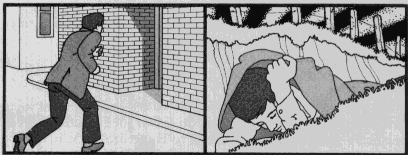
Light and heat from an explosion will last for up to twenty seconds, but blast waves may take up to a minute to reach you. If after ten minutes there has been no blast wave, take cover in the nearest building.
What to do after the Attack:
After a nuclear attack, there will be a short period before fall-out starts to descend. Use this time to do essential tasks. This is what you should do.
Do not smoke. Well, no more than one.
Check that gas, electricity and other fuel supplies and all pilot
lights are turned off.
Go round the house and put out any small fires using mains water
if you can.
If anyone's clothing catches fire, lay them on the floor and roll
them in a blanket, rug or thick coat. And blow, if you have to.
If the mains water is still available also replenish water reserves. Then turn off at mains.
Do not flush lavatories, but store the clean water they contain by taping up the handles or removing the chains. Important: remember to untape handles before using the lavatories again the next day.
If the water supply is interrupted extinguish water heaters and boilers (including hearth fires with back boilers). Turn off all taps.
Check that you have got your survival kit at hand for the fall-out room. (See the list of survival items.)
If there is structural damage from the attack you may have some time before a fall-out warning to do minor jobs to keep out the weather using curtains or sheets to cover broken windows or holes. You could even put up those shelves you've meaning to get around to. And the bannister's a bit loose as well. Have a look at that.
If there is time, help neighbours in need, but listen for the fall-out warning and be ready to return to the fall-out room.
What to do on hearing the Fall-out
Warning:
(Remember you may hear a fall-out warning without hearing an explosion.)
In the open
If you are out of doors, put up an umbrella. If you don't have an umbrella, take the nearest and best available cover as quickly as possible, wiping all the dust you can from your skin and clothing at the entrance to the building in which you shelter.
At home

All at home must go to the fall-out room and stay inside the inner refuge, keeping the radio tuned for Government advice and instructions. Looks good doesn't it?
Stay in your refuge
The dangers will be so intense that you
may all need to stay inside your inner refuge in the fall-out
room for at least forty-eight hours. If you need to go to the
lavatory, or to replenish food or water supplies, do not stay
outside your refuge for a second longer than is necessary. Not
even one. After forty-eight hours the danger from fall-out will
lessen - but you could still be risking your life by exposure
to it. The longer you spend in your refuge the better. Listen
to your radio. You never know. Steve Wright might be on.
DO NOT GO OUTSIDE until the radio tells you it is safe to do so.
Or the voices in your head. Whichever you feel more comfortable
with.
Later on
Have a good laugh about it all.
Visits outside the house may at first be limited to a few minutes for essential duties. These should be done by people over thirty where possible. They should avoid bringing dust into the house, keeping separate stout shoes or boots for outdoors if they can, and always wiping them.
Casualties
You may have casualties from an attack,
which you will have to care for, perhaps for some days, without
medical help. Be sure you have your first aid requirements in
your survival kit. (See the list of survival items.)
Listen to your radio for information about the services and facilities
as they become available and about the type of cases which are
to be treated as urgent.
If a death occurs while you are confined to the fall-out room
place the body in another room and cover it as securely as possible.
Attach an identification. If it's your grannie, clearly label
her "Dead Old Biddy". No time for sentiment here.
You should receive radio instructions on what to do next. If no
instructions have been given within five days, you should temporarily
bury the body as soon as it is safe to go out, and mark the spot.
On hearing the ALL-CLEAR
This means there is no longer an immediate
danger from air attack and fall-out and you may resume normal
activities. That's it. Well done. You've survived.
4 Your action check list
Here is a check list, which reminds you
of the actions you must take to provide the protection outlined
in this booklet.
Use the check list systematically, ticking off each item as you
deal with it. This will help you to remember all the things you
must do.
| Action Before Attack | Tick When Completed |
| Warning Sounds | |
| 1. Do you know the warning sounds? | |
| 2. Have you cleaned the wax from your ears recently? | |
| Fall-out Room | |
| 3. Have you chosen your fall-out room? | |
| 4. Have you blocked up the windows and other openings (e.g. vents, chimney) of your fall-out room? | |
| 5. Have you put up the dartboart? | |
| Inner Refuge | |
| 6. Have you made your inner refuge, inside the fall-out room? | |
| 7. Have you bought enough peanuts? | |
| Survival Kit | |
| 8. Have you put the following items in your fall-out room? | |
| a) enough beer, in sealed or covered containers, to last you and your family for 14 days? | |
| b) enough food to last you and your family for 14 days, including crisps, pork pies, cheese ploughmans, twiglets, cheesy wotsits - and a closed cupboard or cabinet in which to store these supplies? |
| c) a portable radio (two if possible) and spare batteries? | |
| d) a copy of the TV Times? | |
| e) warm clothing and changes of clothing? | |
| f) bedding? | |
| g) a cricket bat? | |
| h) torches, with spare bulbs and batteries, candles and matches? | |
| j) table and chairs? | |
| k) toilet articles? | |
| l) a pack of cards? | |
| m) notebook and pencils? | |
| n) cleaning materials, including cloths, tissues, brushes, Mr Sheen, shovels and that bloody box of dry sand? | |
| o) improvised lavatory seat, polythene buckets fitted with covers, polythene bag linings, for emptying the containers, strong disinfectant and toilet paper? | |
| p) a lava lamp? | |
| 9. Have you made arrangements to cover your extra water supplies in the bath, sink and wash-basin? | |
| Sanitation | |
| 10. Have you put the following just outside the fall-out room? | |
| a) a dustbin for temporary storage of waste matter? | |
| b) a rollerskate? | |
| Fire Precautions | |
| 11. Have you painted all windows that are not blocked up? | |
| 12. Have you got rid of all old music papers and other junk that can catch fire easily? | |
| 13. Have you taken down the net curtains? | |
| 14. Have you got buckets of water ready at the top of the stairs? | |
| 15. It you have a fire extinguisher, is it ready and in working order? | |
| Action on Attack Warning | |
| 16. Have you sent the children to their beds without any tea? | |
| 17. Have you turned off the gas? | |
| 18. Have you turned off the television in the front room? | |
| 19. Have you closed the stoves and damped down fires? | |
| 20. Have you shut all the windows and drawn the curtains? | |
| 21. Have you filled the bath, sink and wash-basin with beer, and covered them? | |
| 22. Have you remembered to push in any aerial on your radio? | |
| Action After Attack | |
| 23. Have you checked that the gas and electricity are turned off at the mains, and that all pilot lights and oil supplies are turned off? | |
| 24. Have you counted your legs? | |
| 25. Have you replenished your water supplies? | |
| 26. Have you taped up the handle, or removed the chain, from the lavatory? | |
| 27. Do you have any hair? | |
| 28. Have you checked your survival kit? | |
| 29. Have you done any minor repairs, to keep out the weather? | |
| 30. Do you feel sick? |
REMEMBER:
The danger from fall-out is greatest in the first forty-eight
hours. During that time you must stay in the fall-out room and
as far as possible within your inner refuge.
If you leave the room to dispose of waste or to replenish food
or water supplies, do not stay outside it for a second longer
than is necessary.
REMEMBER:
The longer you spend in your refuge and your fall-out room after
a fall-out warning the less the danger to your lives.
REMEMBER:
To listen to your radio. Just avoid the news.
REMEMBER:
To conserve your stocks of water and of food, and to keep them
sealed, covered or wrapped - and close the cupboard door.
Beer means life. Re-use it for different purposes, using as little
as necessary for cooking. Cans of food, pierced through the top,
may be heated in a saucepan of beer and the same beer used several
times without cleaning the pan.
Used utensils can be cleaned by holding or placing them in the
same hot beer.
REMEMBER:
Avoid waste.
REMEMBER:
To carry out your sanitation arrangements with care.
Keep separate containers for lavatory waste and for other rubbish.
Keep all containers covered.
Keep hands as clean as possible.
Keep your calm, your resolve and your pride in your country
Protect and survive

Keep this booklet handy
Further reading
A booklet, Nuclear Weapons - Are They All Bad? (ISBN
0 II 340557 X), published by Her Majesty's Stationery Office,
is also available. It contains detailed information about the
effects of nuclear weapons and will be of interest to those who
wish to further their knowledge of the subject.
A leaflet, Domestic Nuclear Shelters For Beginners, also published by Her Majesty's Stationery Office, is available. This includes advice on domestic shelters providing protection against nuclear explosions.
Prepared for the Home Office by the Central Office of Information
1976 (Reprinted 1980)
Printed in England for Her Majesty's Stationary Office by UDO
Litho Ltd.
Dd. 0018872 Pro. 14347 K1200
ISBN 0 11 340728 9
HMSO 50p net
First Published 1980